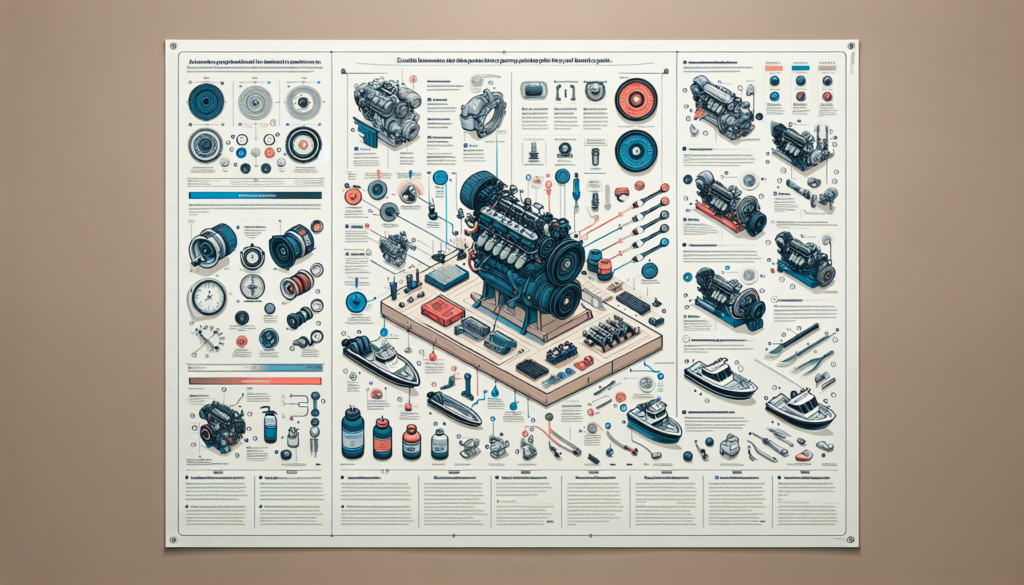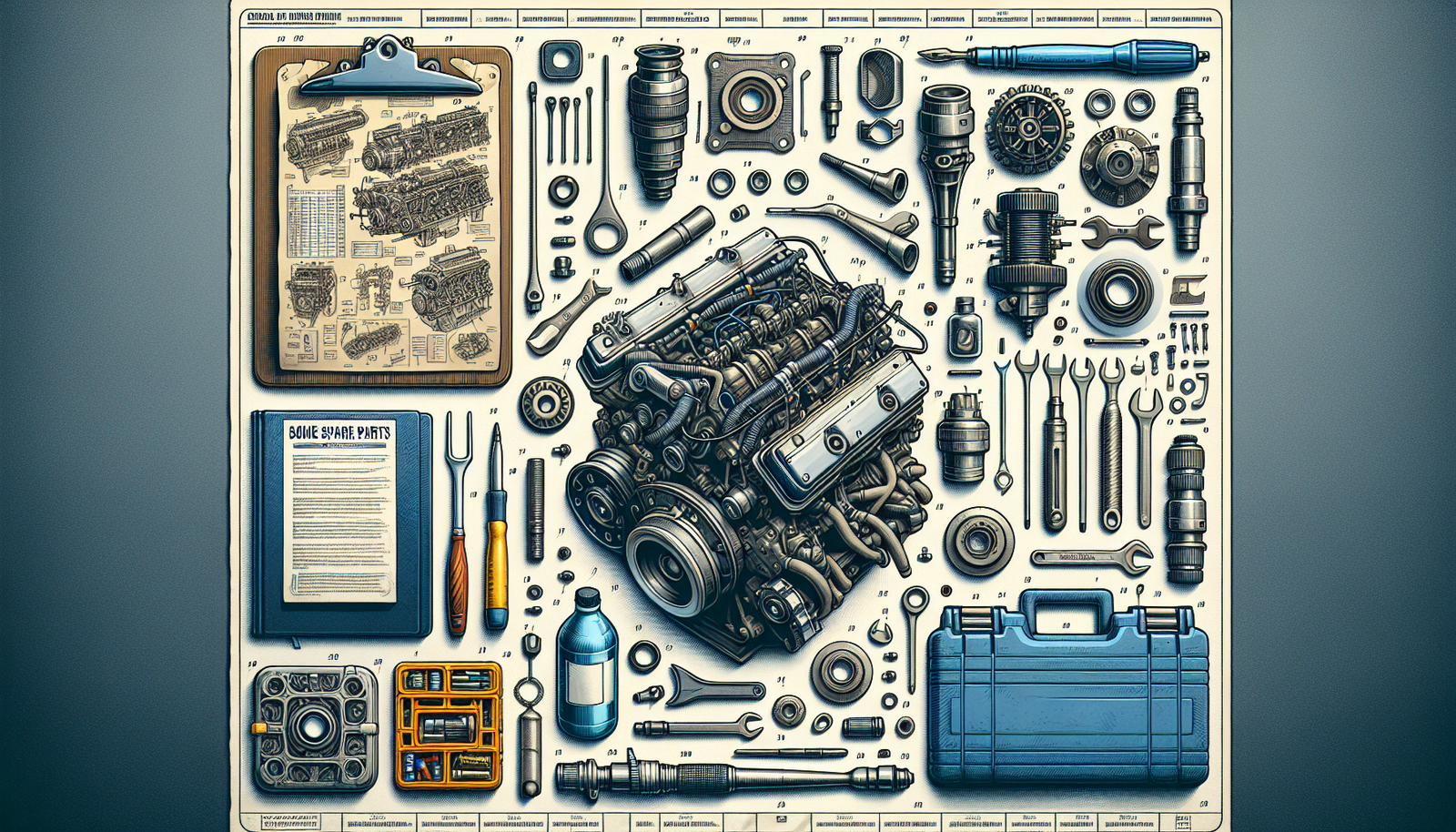If you’re someone who enjoys the freedom of sailing open waters, then knowing how to handle sudden mechanical hiccups is a skill you’ve got to have. “Must-Have Boat Engine Spare Parts For Emergencies” is the perfect guide for you. This article breaks down the top-ranking, most crucial spare parts you should always keep handy on your boat to troubleshoot unexpected engine troubles. With this guide in your arsenal, you’re going to be better equipped to take swift action and make the necessary fixes when you need to. Get ready to cruise with confidence and peace of mind as we navigate this essential boating topic together.

Importance of Spare Parts
Owning a boat provides an array of pleasures, from relaxation to adventure, there is so much to enjoy, but it requires constant upkeep and attention. A crucial aspect of maintaining your boat’s performance is understanding the significance of spare parts.
Understanding the need for spare parts
Spares are your safety net, they step in when something fails unexpectedly. You cannot always predict when a part will wear down or face a sudden malfunction. With crucial spare parts at hand, you can tackle mechanical problems without facing extended downtime, enhancing your experience considerably.
Potential scenarios requiring spare parts
Let’s picture this: you’re in the middle of a long cruising journey and suddenly, your fuel filter clogs or your engine belt breaks. Without a replacement part, you could find yourself stuck, waiting for help to arrive. Spare parts can prove to be an absolute life-saver in times of crisis or minor system failures.
Preventive Measures and Routine Check-ups
Preventive care is the key to long-term boat engine durability and functionality. Regular inspections and part replacements can help you avoid surprise break-downs during your journeys.
The role of regular maintenance
Just like any other mechanism, a boat engine benefits greatly from regular check-ups. These inspections help identify vulnerabilities, forecast potential issues and replace worn-out parts before they malfunction in the most inconvenient moments.
Negligence and its repercussions
Ignoring the need for regular maintenance could lead to dire consequences. The repercussions could range from minor system glitches to severe engine damage. If neglected too long, repairs can become extensive and expensive.
Impact on the longevity of boat engine
Proper maintenance isn’t just about avoiding inconveniences; it’s about extending the lifespan of your boat’s engine. By diligently keeping an eye on engine parts, and ensuring their optimal condition, you can significantly improve the engine’s lifespan and performance.
Knowledge of Engine Components
Understanding your boat’s engine, its parts, and functions, can be greatly advantageous. It can help you pinpoint issues quickly, hastening the repair process.
Basic description of critical engine components
A boat engine consists of various parts such as the propeller, engine belts, oil filters, spark plugs, thermostats, and impellers, among others. Each component has a unique role in the engine’s operation.
Identifying and understanding the function of each part
It’s essential to recognize each part of your engine and understand its functionality as it helps in troubleshooting. For example, if you can immediately identify when your engine belts are worn out or your spark plugs are malfunctioning, you can address the problem much quicker.

Spare Fuel Filters
Fuel filters play a vital role in ensuring the smooth operation of your boat’s engine.
The role of fuel filters
Fuel filters remove dirt, rust, and other impurities from the fuel before it enters the engine, helping to increase its efficiency and longevity.
Possible issues due to faulty fuel filters
If the fuel filter is clogged or faulty, the engine may not receive enough fuel, which could lead to decreased performance or even damage to the engine.
Choosing the right fuel filter
When selecting a fuel filter, make sure it’s compatible with your boat’s engine. Consider factors like filter size, material, and the manufacturer’s recommendation.
Thermostats and Impellers
Two other crucial components of a boat engine are hermostats and impellers. When these fail, they can bring boating activities to an abrupt halt.
Understanding the function of thermostats and impellers
The thermostat regulates the engine’s temperature, ensuring it does not overheat. Meanwhile, the impeller aids in cooling the engine by pumping water throughout the system.
Possible issues due to failure
Failure from any of these components can result in your engine overheating and causing extensive damage.
Choosing quality spare parts
Investing in high-quality thermostats and impellers increases your chances of avoiding such breakdowns. Always stick to reputed brands and make sure the spare parts are suitable for your specific engine model.
Engine Belts
Engine belts play a pivotal role in your boat’s engine performance.
Importance of engine belts
They help in functioning of various accessories like alternator, water pump, and power steering pump. They ensure these components get the rotational energy they need to work effectively.
Indicators of problems with the engine belt
Common signs of belt problems include squealing sounds, cracks, or shredding on the belt, and difficulty in steering the boat.
Tips to choose suitable engine belts
When selecting a spare engine belt, always go for an item that matches the specification of your original engine belt – in terms of length, width, and ribbed pattern.
Oil Filters and Spark Plugs
Oil filters and spark plugs are yet another notable parts of a boat engine.
Role of oil filters and spark plugs in engine’s operation
The oil filter cleans the engine oil, preventing dirt or particles from entering the engine, while spark plugs are crucial for ignition, creating a spark that starts the engine.
Possible problems due to their malfunctioning
Faulty oil filters can lead to engine wear and tear, whereas, malfunctioning spark plugs may cause poor fuel economy, loss of power, or problems with cold starting.
How to choose correct oil filters and spark plugs
Always make sure you are purchasing oil filters and spark plugs that are recommended by your boat’s manufacturer, as they are designed specifically for your engine.
Spare Batteries
Having a spare battery aboard is always a good idea, to avoid being left stranded due to an unexpected power outage.
Necessity of having spare batteries
A spare battery not only powers your boat’s engine, but also operates other essential accessories like lights, radio, and GPS.
Potential issues due to battery failures
A battery failure can result in losing power to crucial navigation and communication systems which can be dangerous during emergencies.
Considerations when purchasing spare batteries
When buying a spare battery, consider factors like compatibility with your engine, power capacity, and dimensional fit into your battery compartment.
Carrying Spare Propellers
Propellers are fundamental to a boat’s performance, and having a spare is a wise practice.
Importance of propellers
A propeller translates the power of the engine to the water, propelling the boat forward.
Possible problems due to propeller breakdown
If a propeller is damaged or breaks down, it can lead to inefficient operating and increase fuel consumption or even damage the engine.
Choosing right propellers
A spare propeller should match the specifications of your boat’s original one. Factors to consider include propeller size, pitch, number of blades, and material.
Storage of Spare Parts
Storing your spare parts correctly will maximize their functionality, whilst limiting potential damage.
Proper storage methods for spare parts
Dry, ventilated spaces are best for storing boat spare parts. Using anti-corrosion sprays and airtight containers can also extend their lifespan.
Impact of weather conditions on spare parts
Exposure to adverse weather conditions like humidity, high heat, or freezing temperatures can cause the parts to corrode, deteriorate, or malfunction.
Storage guide for different types of spare parts
Different parts have different storage requirements. For instance, batteries should be stored in a cool, dry place off the floor, and propellers need to be kept clean and dry to prevent rust or other damage.
In conclusion, having the necessary boat engine spare parts for emergencies, along with preventive measures, regular check-ups, and proper knowledge of engine components, can save you from a lot of trouble and ensure you a smooth sailing experience.

